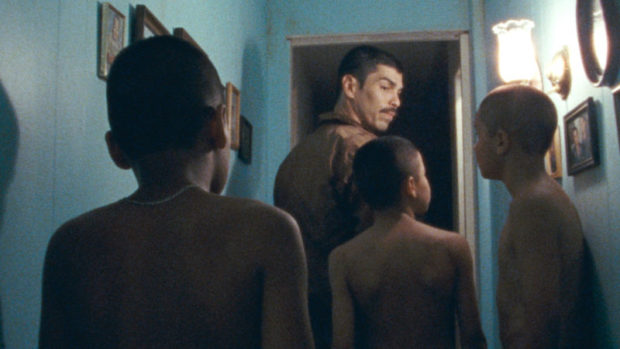
 Three boys grow up in the midst of ugly family conflict, in this lyrical evocation of childhood tragedy.
Three boys grow up in the midst of ugly family conflict, in this lyrical evocation of childhood tragedy.
When realism comes together with lyricism, you have the makings of a great film. We the Animals, directed by Jeremiah Zagar, manages to achieve that in a tale of three boys growing up in the midst of ugly family strife, adapted by Zagar and Daniel Kitrosser from a novel by Justin Torres.
A young Puerto Rican father (played by Raúl Castillo) and an Anglo mother (Sheila Vand) are raising their three sons, very close in age, in a home somewhere in the rural northeast. Actually, one of the questions I had watching was, “Where are they?” which I don’t think is actually explained in the movie, but if you go to the book, it turns out to be upstate New York. Well, it doesn’t matter, really—the boys run wild through the wooded countryside, brown and most of the time shirtless, with little or no connections to their white neighbors.
Joel, Manny and Jonah have a close bond—they’re always together and sleep on the same large bed. But we gradually see that the youngest, Jonah, is a little different. He likes to crawl under the bed at night with a flashlight when the others are asleep and draw in his secret notebook. And here Zagar’s lyrical style takes charge—Jonah’s drawings become animated, acting out the boy’s private thoughts and fantasies in beautiful, mysterious patterns. The one clue we get from everyday events that Jonah might be a little different is when the family goes swimming. The two other boys know how, but Jonah hasn’t learned and is afraid to learn. Pops has him climb on his back and float out into the pond with him, but then pushes him off so that, he thinks, Jonah will be forced to swim. The trauma of helplessly sinking underwater becomes one of the film’s recurring themes.
Jonah is our narrator and our point of view, so when the parents fight, and Pops punches Ma and knocks a tooth out, we don’t see it, we only hear it from another room, and then see the bloody tissue on the table next to the couch where Ma is lying. Pops leaves for a while, and Ma goes into a deep depression, leaving the boys to fend for themselves like wild animals, and thus, I assume, giving us the title We the Animals. Pops eventually comes back, but the tension never leaves, and sensitive Jonah internalizes all of it.
Rather than a plot in the traditional sense, the film presents a series of connected episodes, much like the experience of children, who don’t understand a lot of what’s going on, yet make their own distorted sense out of it. Evan Rosado, in his first role, projects a spiritual glow as Jonah that is heartbreakingly tender. All the actors are wonderful, with much of their dialogue seeming natural and spontaneous, and the best is Raúl Castillo as Pops, who manages the incredibly difficult feat of portraying a man who can be loving and vulnerable and also—abusive.
The picture is shot in Super 16 millimeter with wide lenses, and this makes the visual texture seem almost like a documentary. At the same time, it’s suffused with the glow of childhood memory. Zagar has captured a feeling for the “now” moment at the center of a boy’s experience, where everything feels present and immediate. The tragedy at the heart of Jonah’s family burns away his innocence and creates a new person who is still in the process growing at the end of the film. We the Animals is a stunning poetic vision, and one of the best films of the year.

